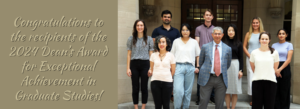2024 Basic Sciences Dean’s Award Winners Announced
The School of Medicine Basic Sciences awarded ten graduate students the 2024 Dean’s Award for Exceptional Achievement in Graduate Studies. These graduate students were recognized for their high academic and scientific achievement and for the originality, significance, and rigor of their dissertation research.
“The biomedical sciences attract graduate students who dedicate themselves with unwavering focus to deepening their expertise, mastering cutting-edge experimental techniques, and pursuing innovative research projects,” said John Kuriyan, dean of basic sciences and holder of the Mary Geddes Stahlman Chair. “The most exceptional among them make transformative discoveries that fundamentally reshape our understanding of core biological mechanisms, uncover the root causes of human diseases, or catalyze pivotal changes in clinical practice. The Dean’s Award for Exceptional Achievement is bestowed upon these outstanding individuals in recognition of their remarkable contributions.”
The awardees were selected by a committee made up of the directors of graduate studies for each of the Ph.D.-granting programs in the School of Medicine and chaired by Walter Chazin, senior associate dean of biomedical research education and training, the Chancellor’s Professor of Medicine, and professor of biochemistry.
Each awardee will receive $5,000 in stipend support per year for the next two years or until they receive their Ph.D., whichever happens first. This year, funds were provided by the Basic Sciences Office of the Dean, the Richard McEwen German, Jr. and Marjorie Wolff German Fund, and the Zenobia and Mark Godschalk Research Fund.
The awardees are:
Caroline Bodnya, Cell and Developmental Biology
Advised by Vivian Gama.
Bodnya studies the effects of peroxisomal dynamics on cell fate decisions during early human neurodevelopment. Specifically, she is exploring whether perturbations in peroxisomal morphology or biogenesis impact peroxisomal-mediated metabolic functions, thus impacting cell fate transitions during neurogenesis.
Avery Bogarts, Molecular Pathology and Immunology
Advised by Dr. Lorraine Ware.
Bogarts studies the molecular processes that underlie lung injury in sepsis. Specifically, she investigates mechanisms of cell-free hemoglobin-mediated damage to the pulmonary endothelial glycocalyx, a regulator of vascular permeability, to identify specific therapeutic targets for sepsis-induced respiratory failure.
Zhengyi Chen, Chemical and Physical Biology
Advised by Ken Lau.
Chen employs computational methods to analyze multi-omics data of colorectal tumors, including their transcriptome, epigenome, and genome at single-cell and spatial resolution. Her project focuses on integrating the multi-modal data to understand how cellular interactions in the tumor microenvironment shape tumor progression.
Amber Crabtree, Molecular Physiology and Biophysics
Advised by Antentor Hinton Jr.
Crabtree studies the molecular mechanisms behind mitochondrial dysfunction in highly metabolic tissues, such as brown adipose and skeletal muscle, concentrating on disturbances in mitochondria-endoplasmic reticulum contact sites and resulting changes in mitochondrial ultrastructure. Her research uses techniques such as primary cell isolation, bioinformatics, in vitro exercise protocols, confocal/STED microscopy, transmission electron microscopy, 3D electron microscopy, and diverse imaging analysis methods.
Soren Emerson, Neuroscience
Advised by Erin Calipari.
Emerson studies the epigenetic mechanisms of substance use disorder. Specifically, he is characterizing the mechanisms by which the novel epigenetic regulator lysine acetyltransferase 2 facilitates cell type–specific transcriptional and functional adaptions in substance use disorder using in vivo and in vitro pharmacology, bioinformatics, and genetic techniques.
Alejandra Flores, Microbe-Host Interactions
Advised by Kristen Ogden.
Flores’ research involves the elucidation of the packaging mechanisms of reovirus. Her approach includes the utilization of defective viral genomes to identify components required for packaging. This award is funded by the Zenobia and Mark Godschalk Research Fund.
Junmin Hua, Cell and Developmental Biology
Advised by Andrea Page-McCaw.
Hua studies cellular responses to trauma wounds. Specifically, her current interest lies in the mechanical and biological cues priming cell-cell fusion after pulsed laser ablation.
Harsimran Kaur, Chemical and Physical Biology
Advised by Ken Lau.
Kaur studies spatial aspects of colorectal cancer using deep learning. Her research is focused on applying neural networks to spatially resolved molecular data to understand the changes in tissue architecture of colonic mucosa along the cancer progression axis.
Kevin McCarty, Biochemistry
Advised by Fred Guengerich.
McCarty studies multistep reaction kinetics and complex oxidations catalyzed by cytochrome P450 enzymes involved in eukaryotic steroid and sterol biosynthesis. Mechanistic studies of carbon-carbon cleavage reactions and processive enzyme kinetics in these enzymes has provided an important advance in the understanding of enzyme function, which researchers hope will be useful in the continued search for P450-targeted drugs. This award will be partially funded by the Richard McEwen German, Jr. and Marjorie Wolff German Fund.
Alyssa Parker, Human Genetics
Advised by Dr. Alexander Bick and Digna Velez Edwards.
Parker uses single-cell sequencing techniques to study clonal hematopoiesis, a preleukemic condition linked to elevated risk of cardiovascular disease.
In 2016, Richard M. German Jr., MD’43, established the Richard McEwen German, Jr. and Marjorie Wolff German Fund through his estate to provide support for the School of Medicine. In 2023, Zenobia and Mark Godschalk, BA’92, established the Zenobia and Mark Godschalk Research Fund to provide support for research in the basic sciences in the School of Medicine.
Recipients for the Dean’s Award for Exceptional Achievement in Graduate Studies are selected based on research excellence, which is evidenced by fellowship awards, publications, and presentations at conferences. The awardees demonstrate a mastery of their disciplines through a track record of high achievement in their classes and of strong performances in their qualifying exams and committee meetings.
All students in Ph.D. programs connected to the School of Medicine are eligible for nomination, including students working on the Ph.D. portion of the Medical Scientist Training Program, the School of Medicine’s M.D./Ph.D. program.
